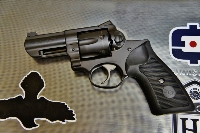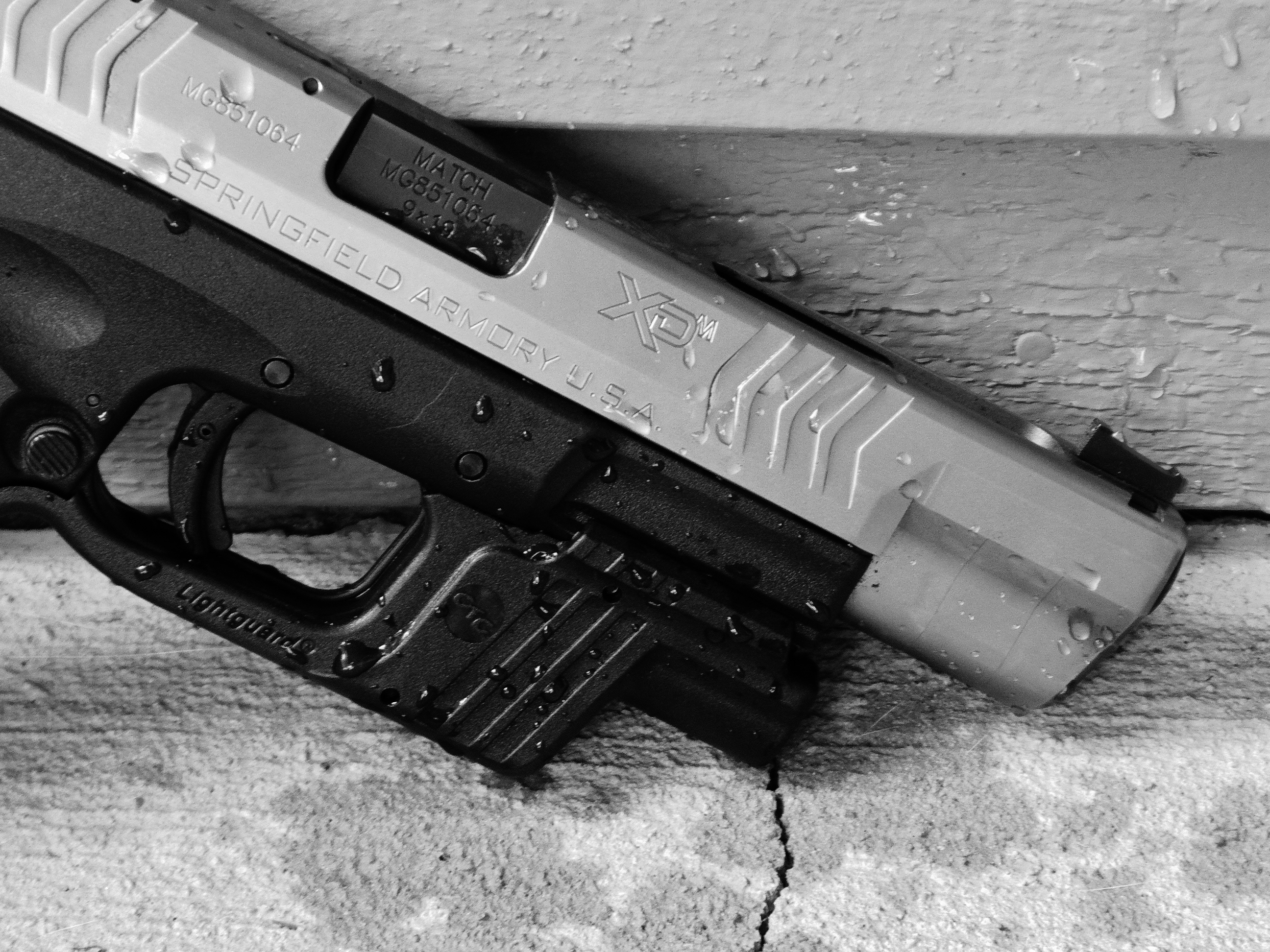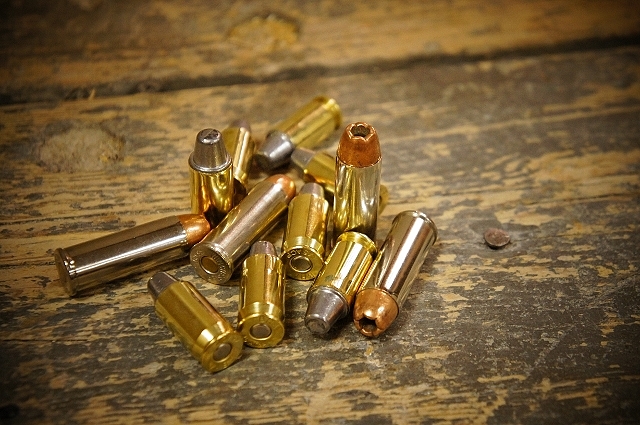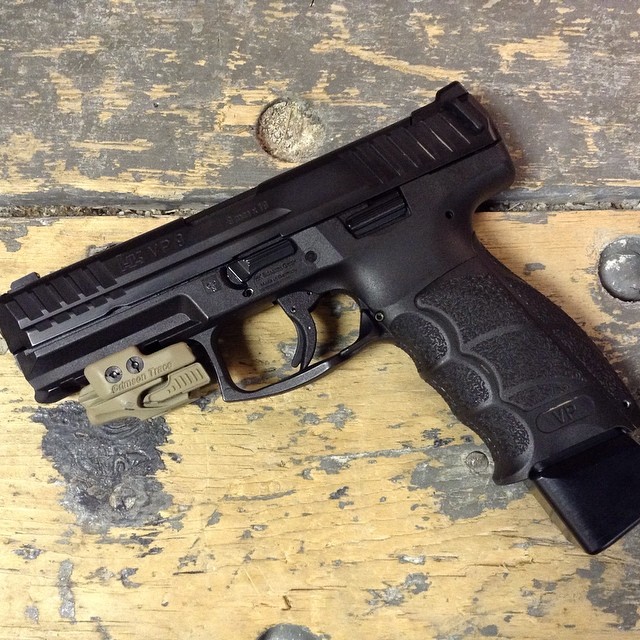We’ve all done it. A friend, colleague, relative, someone who is new to guns comes to us to get advice on buying their first gun, because we’re their token “gun-friend.” It happens, and hopefully we haven’t jacked people up too much. However, when you’ve been doing this for a while, you start to hear common examples of advice that people are given. Often I hear them when someone comes through a class and I ask why in heaven’s name they have that particular piece of gear. After sitting down, I picked the first worst (best?) examples. If someone comes to you for advice, don’t do this.
5. Get the biggest caliber you can control
Sigh. I’ve probably said this at some point in my past, and for that I’m very, very sorry. This nonsense is how untalented, brand spanking new shooters end up with tiny carry guns chambered in .40 S&W and .45 ACP, which results in them developing a wicked flinch whenever they go and fire it. Think about it: someone with no real gun experience goes and buys a Glock 27 because it’s small, and chambered in a “powerful” cartridge. They go the range and it’s all sturm and drang and sharp recoil, so they’re disinterested in future practice with it.
In this scenario, there are two options for good advice. If you think the person is interested in actually becoming a shooter, tell them to get a friggin’ .22 LR. Then they can actually learn stuff instead of just hammering bullets low and to left in a B27. However, if you don’t think they’re really interested in guns as a hobby and just want something for home protection, just tell them to get a full size 9mm service pistol. Be a good friend and explain that handgun stopping power is a myth, and there is not significant difference in terminal ballistics between any of the service cartridges.
4. Get a pocket gun because most self-defense situations you don’t need to shoot
This one drives me up the wall, but I’ve heard more than a few people say it. The line of reasoning is that since you probably won’t need to shoot your gun, the best idea is to get something that is completely unobtrusive, that you won’t have to put any effort into carrying. The thing that obviously drives me nuts about this is that it kicks off a logical progression that if followed to its only conclusion is that you don’t really need to carry a gun at all, all you need is a gun-shaped object.
Here’s the problem: what if your gunfight is an actual gunfight? What if you actually need to shoot someone? All of a sudden that little .380 with crappy sights and a heavy trigger isn’t so optimal, is it? No one who’s ever been in a real fight wished they had a smaller gun or less ammo; so why would you intentionally compromise your choices?
3. Get a revolver because they never jam

This one is a personal pet peeve of mine. I love revolvers. I think they’re great. They’re mechanical interesting, they challenge me as a shooter, and they connect us to history, just a little bit. They also absolutely do fail mechanically, and when they do it frequently requires tools to fix.
I get the reasoning behind this one though, because it assumes the novice is going to want something that is easy to deal with if something goes wrong. Yes, it’s true that if you get a light primer hit on a wheelgun, the fix is simple: pull the trigger. But there are plenty of things that could happen to a wheelgun that aren’t light primer hits, and fixing those is a lot more complicated than “just pull the trigger.” Especially if you can’t pull the trigger, because I’ve seen that happen.
2. Get whatever your local police department uses
I personally have fallen prey to this one on multiple occasions, because the logic behind it is so appealing. On surface it makes sense, because the odds are that your local PD isn’t going to be carrying some derpy POS around. But the flip side of that is that a gun selected by a committee that is largely disinterested in anything other the price, and intended to be carried around on a duty belt for 12 hours a day unconcealed may not be the best choice for concealed carry.
Additionally, political administrators frequently like to saddle their officers with trigger mechanisms that are intended to inhibit negligent discharges, but all they really accomplish making the gun more difficult to shoot should you actually need it.
1. Get whatever feels best in your hand
This piece of advice however is the worst of them all. It rules the roost of bad gun buying advice, because what you’re asking a newbie with little understand of guns to do is select a piece of life saving equipment based purely on how it feels in your hand. Let me tell you something, cochise. There are a lot of aggressively shitty guns that feel wonderful when you hold them, but that can’t get through a box of ammo without crapping out.
That’s really the problem. I’ve had lots of people complain that Glocks don’t “feel good” in their hand. Tough noogies, because they’re awesome. Thankfully, I’ve almost never heard the same thing about M&Ps, which are also awesome, and generally have “feel good.” But just relying on how a gun “feels” in your hand is the peak of bad advice. It doesn’t inform you on how the gun functions, how accurate it is, how reliable it is, or even if it’s comfortable when you start to shoot it. There are guns that feel great when you’re just holding them, but when you start putting rounds down range you discover that recoil changes things. A great example of this is the Ruger SR40, which I generally like, but when I started shooting it a lot, the safety ended up chewing a hole in my hand.
The point of all of this is to not give people bad advice. When someone who isn’t a gun person comes to you for advice, they’re in the awful situation of not knowing what they don’t know; and they’re likely relying on your opinion to steer them in the right direction. What can you do to help them? The best advice possible is to try and get them to take one of the many “introduction” classes, where you don’t need a gun to attend, because the range provides all of that. If that’s not an option, help them pick a reliable, concealable defensive handgun chambered in 9mm. Like a Glock 19. Or an M&P Compact.



To add to #4: You don’t need good sights, because most defensive encounters are less than 3 yards. This is usually coming from people with pocket guns with crappy, or no *ahem Taurus Curve* sights, and want to justify it. I understand that the probability using them is lower, but if the need arises, why would I want to NOT have them?
There should be a cavete on #1: if you can’t get someone to a range with a class and they are trying to choose between 2 great guns (Glock and M&P) how it feels in the hand could be acceptable advice once they are taught how to hold the gun and how to see if the gun fits them properly in both hand size and intended use.
Seems to me there’s a kernel of truth in each bit of bad advice, but it’s not good advice for a newbie. A newbie isn’t going to be able to evaluate the nuances that might actually lead someone to select a snubby, or a pocket gun, or whatever. For him or her, “medium sized 9mm from one of the major makers, consistent with your budget. Pick one, shoot it a bunch.”
The right way to do “get what feels best” is to amend it to “given the array of “good 9mm service pistols, choose the one that feels best.”
Here’s to hoping there’s a list of 5 best examples of advice given to newbs coming along.
The problem is that list would be really boring:
“Here is a list of mid-sized service pistols in 9mm: Glock 19, M&P, HK VP9, Sig P229, Beretta 92 Compact. I’m probably leaving one or two out but whatever. Go buy one of those, get 1,000 rounds of ammo, and go take a class from a reputable instructor.”
But, that’s only four. You fail at lists, sir.
Actually, no I love your lists.
Except, fit is important…mid-size service pistols don’t necessarily fit the person that has small hands. The replaceable backstraps on the M&Ps and Gen4 Glocks help. The critical measurement is really the trigger reach. Also, mid-size service pistols in 9mm may still be too intimidating to those with weak hands, etc. I’ve had a lot of success with students in beginner classes that couldn’t shoot a 9mm (or larger caliber) pistol but did very well when I put a S&W 4″ barrel K-frame in their hands and have them shoot .38 Special. When I encounter a student that is struggling I’ll have them start shooting a S&W Model 17 and then move them to a S&W Model 10/15/19/66/67–all service-size revolvers with some weight to them. They are typically pleasantly surprised by the mild difference in recoil. I see this as another advantage of the revolvers–much more variability available by swapping grips.
I would replace the Sig P229 with the Sig P320 on your list of 5.
Or, before they run out and buy one, they could go to a range that has rentals and try out some of those you listed (and some you didn’t ***cough*** Walther PPQ ***cough***). Then they can see which one might work best for them.
This also allows them to try out different calibers to see which one they will be most comfortable starting with.
A small caveat to #2: Police agencies don’t solely buy or authorize guns based on price; if they did they’d all be carrying Hi-Points. They base their choices on price within a certain acceptable range of quality. That’s why most cops carry Glocks, M&Ps, Berettas, or Sigs; they are reliable, quality weapons that are affordable to most municipalities.
And police agencies’ guns aren’t all meant for open carry in uniform holsters. They buy or authorize smaller guns (usually smaller versions of the uniform guns) for their detectives, administrators, etc., specifically for concealed carry. So saying “Use the same guns the cops do” isn’t really bad advice.
And if you ever have to use a pistol in self-defense, using the same gun as the police do makes it hard for an opposing lawyer or activist to convince a prosecutor, a grand jury, or a criminal or civil trial jury that you’re a psycho vigilante Rambo wannabe.
Of course, all advice should conform with reality. A 90-pound grandmother shouldn’t take that advice if her local cops all carry Glock 21s
Usually when I’m asked, I point them to my local range and tell them to try 3 handguns. When it comes time to pick out of three, I asked which one did they shoot better with and which they felt more comfortable with. This was the route taken when my wife wanted her first handgun. She chose the M&P 9c and shoots it well and often.
#5 is a red herring. The argument the author makes assumes that the buyer DIDN’T follow the advice, but then blames the advice. He’s literally saying “Don’t get the biggest caliber you can control, because you can’t control it.”
And, that’s sturm und drang, not sturm and drang.
I don’t know of any name brand revolver that is prone to malfunction. Author is smoking crack.
Fun fact: I never said revolvers were prone to malfunction. Most factory revolvers are incredibly reliable.
What I did say is that when revolvers do break, which does happen, it is usually catastrophic and requires tools to fix. On top of that, I guarantee I’ve shot more rounds out of wheelguns than you and everyone you know combined, and I have personally seen multiple types of revolver malfunctions. But you’re right, I couldn’t possibly know what I’m talking about. It’s not like a simple google search for my name would show tons of videos and posts specifically talking about revolvers.
You’re correct. Revolvers do malfunction, and they go hard. Had a 500 take a dump after a really light squib lodged 1/8th and inch into the barrel…
This post absolutely needs a “like” button.
I can say that you have probably not shot more rounds through a wheel gun than I, but I am also quite a bit older than you.
Having said that, I have had every type of tied up revolver imaginable over the years. On reloads it is often the result of a high primer or the result of failing to anticipate the correct amount of crimp to apply to a heavy recoiling load. I have also had guns fail to work with factory ammo – this is normally the result of the hand or bolt finally wearing out and either breaking off or failing to push the cylinder into battery for the next shot.
I usually groan when somebody tells me that the revolver failure corrective is to simply pull the trigger again. When it gets tied up, you can break the trigger components before you are able to make it go off again.
I was in Law Enforcement before the semi-auto was commonly issued. In my basic training academy (1989), you could not qualify with a semi-auto. Let me assure you revolvers fail, it may not be common but it does happen. 180+rounds per day times 60 Officers and you see it happen. Believe me our armorer was NOT the may tag repairman.
PS We just knew that the Brass was out of their minds for issuing those Tupperware Glocks. Yep, we were kinda like the Earth is flat folks, proven wrong.
Get what you can shoot well.
Get what you’ll actually carry all the time.
Don’t skimp on quality to save a few bucks. If you think you can get a gun reliable enough to trust your life to for under $300*, you can’t.
*There are a few exceptions, but if you’re asking for advice on buying a gun, then you don’t know how to tell the difference.
Read read read. I read every article i can. Which guns top anerican instructors prefer, military preference comments by others rwspected in the field as well as fiends etc. The local range rents guns tryba few top names out to get a feel barrel length,caliber, handle rake angle, trigger pull etc. I tried this and have a vp9, xds 45 carry, 2 Springfields service 9 mm and 1 xdm 9mm all feel very different but provide a great shooting experience
While I agree with # 1 on it’s own…
It can, in a larger sense, be part of the decision making process and should be at least taken into account. My pet peeve is the caliber argument, as you pointed out that there is little difference between common handgun ammunition. I take my friends out with an array of hand guns and I start them with the .22
I’ve heard people saying all the above. I agree on one big point, size matters. Whether it be the caliber or the gun itself. Don’t pick a bulky heavy gun, and don’t pick a pocket 45. A first time shooter, could never shoot again with, say, my SR40c. Might scare them, or hurt there hand. For me it’s perfect. But, it’s not a gun for all, as mentioned by the writer. Not every gun is. Example, I HATE GLOCK, that’s me. Best advice I give a newbee to guns. Go to a range that rents them. Buy some rounds and try 5, 6, 10 different ones. Find the gun that’s right for you. One you will use, not one that sits in a drawer. I got one of those myself. Think we all do.
I’m amazed. I’ve never seen anyone write such a sound, logical, well thought out article and still find myself disagreeing with nearly every point. (5) DO carry the largest caliber you can control. Start with a .22 and move up gradually to the point were a larger caliber will do more harm to your successful carry than good. If all rounds were created equal we’d all still be using .22s anyone who says otherwise doesn’t understand physics. (4) Do get a gun you can easily carry. A single stack .380 in the pocket is worth more than the Glock 17 and five magazines in the safe. (3) DO consider the revolver. Yes any device can fail, but the odds of a well made revolver failing in your lifetime are remote in the extreme. I’ve had more failures in the Glock 17 I’ve carried at work for the past three years than I have from every revolver I’ve ever used combined over the last twenty some odd years carrying and shooting them. (2) Most cops carry the Glocks you yourself called “awesome” if you want a service auto they aren’t a bad way to go. (1) Glocks are uncomfortable, and because they are uncomfortable I have to continually retrain myself to hold my hands in weird position to shoot well with it (the bed spring of a trigger doesn’t help). Accuracy is key and accurate guns are comfortable guns. That said DO keep an eye toward quality. You get what you pay for!
The caliber one is sort of missing the point – no one said “carry a .22,” because that’s silly. However, when it comes to 9mm vs .40 vs .45, there is no appreciable difference in terminal performance between any of the duty pistol cartridges.